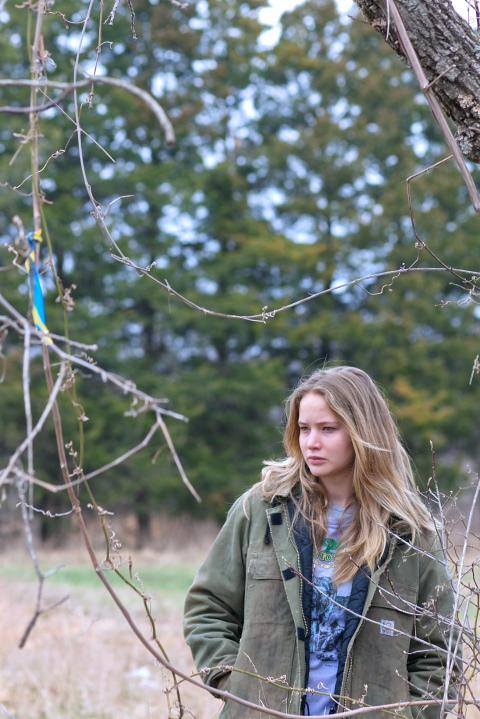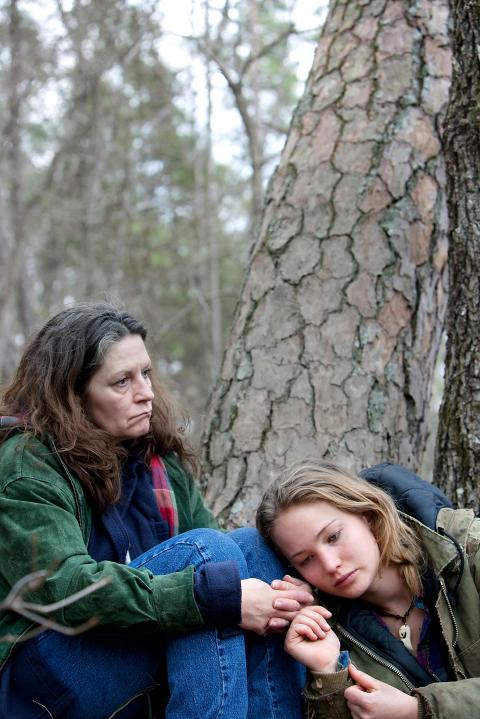Winter’s Bone was a big favorite at Sundance last year, and has done well at numerous independent film festivals since then, but it failed to hit the spot at the Oscars. This probably says more about the nature of the Academy Awards than it does about the film, which features some brilliant performances from little-known actors and a style that spans both art house noir and mainstream thriller.
The story of Winter’s Bone is deceptively simple, and the setting initially does not promise much.
Social realism from the backwoods of Missouri’s Ozark mountains, with hard scrabble families eking out a living from unpromising soil, subsidized by a culture of crime — mainly the cooking up of methamphetamine in isolated locations of a highland region — could easily prove a real downer.

Photo courtesy of CatchPlay
The setting in the depth of the Missouri winter brings to mind the Canadian film Frozen River, which was given a small release in Taipei in June last year. The cold, and chilly fingers of death, linger over people already living on the outer periphery of normal life. Winter’s Bone achieves the impressive feat of internalizing this harsh environment and making it part of the people who populate this story.
The heart and soul of Winter’s Bone is 19-year-old Jennifer Lawrence, who is spellbinding to watch as Ree, a teenager charged with the care of two young siblings after her father jumps bail and her mother has tuned out from all her children’s needs (whether from psychiatric or drug-related reasons is never made clear, though Ree’s antipathy to the drugs widely available in her community suggests the latter). The ramshackle house in which she lives and some nearby land are her only financial assets, but these have been placed as bond for her father’s bail. Ree’s father has failed to turn up, and unless she can bring him back, or prove that he’s dead, she’ll be without a roof over her head.
It is more than probable that quite a large number of people living in her immediate area, many of whom Ree is tangentially related, know something about what happened to her father, Jessup. We are introduced to Jessup though hearsay and rumors, none of which seems to make him a particularly attractive character, but this does not in the least reduce his importance to Ree, who needs to find him in order to survive. She does not pretend to have any particular love for her father, and the best thing she can think to say about him is that he “never cooked a bad batch” of meth.

Photo courtesy of CatchPlay
Her relatives are unwilling to talk, and this reluctance is backed up with force. For them, it is simply a matter of managing family affairs, and killing an intransigent member of the clan may be unpleasant and regrettable, but needs must, and these are not the sort of people to baulk at a bit of blood. Fortunately for Ree, blood ties also matter, and she finds an unlikely ally in her Uncle Teardrop, an unstable and violent man who is probably as much a liability as a friend. John Hawkes, who plays the role, manages to embody shocking violence and intense vulnerability without recourse to sentimentality. For all the assistance he gives Ree in her quest, he never allows himself to be sympathetic, and he walks off the screen in the final scene of the film on a quest that can only lead to more violence. As brilliant as Christian Bale’s performance as Dicky Eklund was in The Fighter, Hawkes’ has an absence of sentiment that makes him even more compelling, more dangerous, and infinitely less likable.
Another performance that deserves special praise is from Dale Dickey, who plays Merab, a matriarch scared by the violent world in which she lives. She warns Ree what retribution she might face if she keeps asking unwanted questions, and does not hesitate to deal out that retribution when her warnings aren’t heeded.
There is a hard edge to Winter’s Bone that makes Ree and her surroundings believable, even in the film’s moments of almost Gothic absurdity. Some of the drug-dealing minors who populate the story are so weird they have to be real (many locals were used as extras).
Ree exists in a system that encompasses extremes of overblown machismo, matter-of-fact violence, and a medieval code of honor that locks people into silence or forces them to exact bloody vengeance. And there seems to be no way out. Fortunately, director Debra Granik does not try to create one.
Winter’s Bone to some extent is a coming of age story, and Ree’s quest for her father makes a woman of her, one who can see the violent logic of her community and who can also accept it (as if she really had any other choice). In Winter’s Bone, growing up is not about becoming free, but about understanding the limits of freedom. It’s not a happy conclusion, but one that is a remarkably potent antidote to the poles of moral vacuity or moral certainty that are usually represented in mainstream cinema.

The canonical shot of an East Asian city is a night skyline studded with towering apartment and office buildings, bright with neon and plastic signage, a landscape of energy and modernity. Another classic image is the same city seen from above, in which identical apartment towers march across the city, spilling out over nearby geography, like stylized soldiers colonizing new territory in a board game. Densely populated dynamic conurbations of money, technological innovation and convenience, it is hard to see the cities of East Asia as what they truly are: necropolises. Why is this? The East Asian development model, with

June 16 to June 22 The following flyer appeared on the streets of Hsinchu on June 12, 1895: “Taipei has already fallen to the Japanese barbarians, who have brought great misery to our land and people. We heard that the Japanese occupiers will tax our gardens, our houses, our bodies, and even our chickens, dogs, cows and pigs. They wear their hair wild, carve their teeth, tattoo their foreheads, wear strange clothes and speak a strange language. How can we be ruled by such people?” Posted by civilian militia leader Wu Tang-hsing (吳湯興), it was a call to arms to retake

This is a deeply unsettling period in Taiwan. Uncertainties are everywhere while everyone waits for a small army of other shoes to drop on nearly every front. During challenging times, interesting political changes can happen, yet all three major political parties are beset with scandals, strife and self-inflicted wounds. As the ruling party, the Democratic Progressive Party (DPP) is held accountable for not only the challenges to the party, but also the nation. Taiwan is geopolitically and economically under threat. Domestically, the administration is under siege by the opposition-controlled legislature and growing discontent with what opponents characterize as arrogant, autocratic

When Lisa, 20, laces into her ultra-high heels for her shift at a strip club in Ukraine’s Kharkiv, she knows that aside from dancing, she will have to comfort traumatized soldiers. Since Russia’s 2022 invasion, exhausted troops are the main clientele of the Flash Dancers club in the center of the northeastern city, just 20 kilometers from Russian forces. For some customers, it provides an “escape” from the war, said Valerya Zavatska — a 25-year-old law graduate who runs the club with her mother, an ex-dancer. But many are not there just for the show. They “want to talk about what hurts,” she